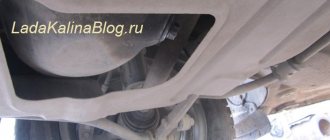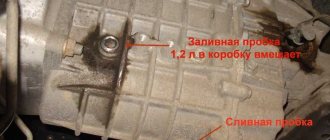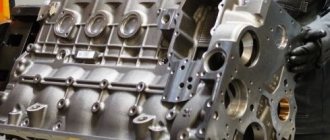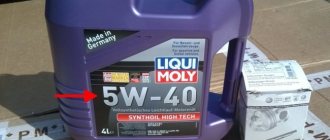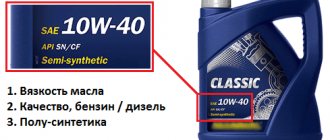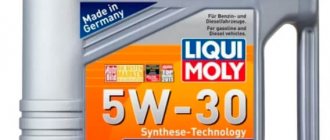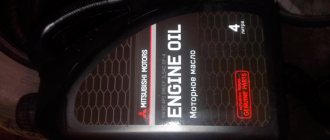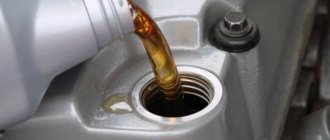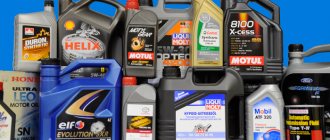Which oil to choose for the Gazelle Next engine
Gazelle Next is very popular among Russian car enthusiasts. This light-duty vehicle was developed at the Gorky plant and put into mass production in 2013. The new version of the Gazelle was equipped with a safe and comfortable cabin, as well as independent suspension and hydraulic power steering.
For full operation of the Gazelle Next engine, it is necessary to use high-quality oil based on mineral or synthesized substances. According to technical regulations, engine fluid in a Russian car is replaced after reaching 10-15 thousand kilometers.
Depending on the type of engine installed, the oil fill volume is 10 liters. As a rule, car enthusiasts use two 5-liter cans. For trouble-free operation of the engine, it is recommended to fill in semi-synthetic with a viscosity index of 10w40.
- Mobile Delvac;
- Lukoil Lux;
- Mannol;
- Magnum Ultratek;
- Nissan.
Optimal oils for Gazelle Next
For an internal combustion engine system running on diesel fuel, it is recommended to use semi-synthetic or mineral oil with a viscosity of 10w40. To ensure long-term performance of the Cummins 2.8 liter engine, the manufacturer recommends using lubricants:
- Shell Helix HX7 10w40 diesel;
- Shell Rimula R6;
- Valvorin Blue 15w40.
The UMZ Evotek 2.7 gasoline unit installed on the Gazelle Next needs to be filled with semi-synthetics with a viscosity index of 10w40 in the summer. In winter, it is recommended to use synthetic oil with a viscosity index of 5w40.
This lubricant can also be used for all-season use. Shell Helix HX7 5w40 is suitable as an alternative option.
Lubricant filling volumes:
- UMZ Evotek 2.7 - 4.5 liters;
- Cummins 2.8 - 6.5 liters.
Shell Rimula R6 10w40
This lubricant is developed on the basis of synthesized substances, using functional additives to protect the internal combustion engine system from wear and contamination. In addition, high-quality oil can adapt to aggressive driving.
Engine protection is achieved thanks to active lubricant molecules and a unique oil composition recipe. Motor fluid retains its original properties and at the same time stabilizes the performance characteristics of the internal combustion engine between replacement intervals.
Shell Rimula R6 oil protects the internal combustion engine from wear throughout the entire period of operation and ensures cleanliness of cylinder valves and pistons. In addition, the lubricant reduces fuel consumption on Gazelle Next and complies with Euro 4 environmental standards. Euro 5 requirements are met if DPF filters are not installed on the Gazelle.
Advantages of using Gazelle Next:
- Saving money on vehicle maintenance. The lubricant is developed according to the requirements of car manufacturers and meets the needs of MAN, Volvo, Mercedes-Benz, DAF, Gazelle Next. This allows specialists to optimize the maintenance schedule and increase the functional performance of the engine over a long oil change interval.
- Comprehensive cleaning of the cylinder-piston group. Shell Rimula contains technological additives that guarantee the cleanliness of cylinders and pistons, as well as the cleaning properties of the oil over long-term operation. As a result, the working life of the motor is extended.
- Reliable protection of mechanisms from wear. Shell oil meets wear protection levels and is suitable for European, Japanese and American engine models. Protects cylinders from slipping and reduces wear on the engine gas distribution system. Thus, the operational period of operation increases.
Cummins engine oils: properties, viscosity, replacement schedule
Cummins engines fully correspond to our drivers’ idea of the quality of automotive equipment.
But for all their reliability, they cannot do without high-quality lubricants. Drivers have already made their choice, and domestic retail chains have already adapted to the emerging active demand for oil for Cummins engines.
There comes a time when the driver definitely wonders what kind of oil to put into a Cummins engine. In the more than rich range of lubricants for these engines, G-Profi MSI Plus 15W-40 oil is considered the best option, and Premium Blue Engine Oil lubricant, as a result of tests, was named the official lubricant for Cummins engines.
According to experts, these brands of oils have the following advantages:
In addition, the following lubricants are acceptable for Cummins engines:
In different countries of the world, the company's research groups are actively working to develop the most optimal types of oils for Cummins diesel engines. Their tests are included in special worldwide classifiers, for example, API. Owners of cars with Cummins engines can only enjoy the fruits of their labor.
Requirements for the properties of engine oils for Cummins
In order for a car engine to last longer without losing its power and other technical characteristics, the driver must provide it with high-quality oil. A good oil filter is also mandatory for this system. In addition, compliance with the technologically prescribed frequency of oil and filter changes plays an important role.
High-quality engine oil does not allow dry friction of engine parts in contact during movement, and, accordingly, failure of parts, breakage of belts and wear of tensioner bearings. In addition, the presence of oil reduces the friction force to a minimum level, if, of course, sufficient tightness of the cylinders is ensured.
By the way, the heat displayed on the instrument panel is not the actual engine temperature. The devices only indicate the degree of heating of the coolant. When the engine is running, their temperature is more or less stable and is usually 90°C. But the temperature of lubricants is less constant and can reach 140 ° C, which depends on the speed of the car.
New models of Cummins fuel filters have the following advantages: ease of dismantling and installation, the highest level of fuel purification, long filter service life and no need for manual pumping.
Externally, the thermostat is a glass or metal vessel, which is protected by thermal insulation from the environment. There are many types of classification of this device, which you can find out about here.
For this reason, developers set the most appropriate level of oil characteristics for each specific engine. If these parameters are observed, a high efficiency is ensured, and engine parts, under standard conditions of use, receive effective protection from unnecessary wear.
The level of oil quality characteristics for a B-C series engine corresponding to average power ratings, according to generally accepted standards of the American Petroleum Institute, must meet the properties of the following classes:
European standards (ACEA) prescribe types of oils belonging to classes E-2, 3 and 5.
If you focus on these categories of oil, this can provide decent conditions for the operation of any Cummins engine.
An important characteristic of motor oils is their viscosity. This parameter is important in the sense that at higher levels the oil will adhere better to the surface of the working parts of the engine. But it must also maintain its fluidity.
It would seem that there is nothing complicated about this. However, it is the viscosity of the lubricant that is most subject to change under the influence of ambient temperature. Therefore, this indicator cannot be called constant; rather, it is variable.
SAE - American Association of Automotive Engineers - presented its own very practical classification of motor oils depending on viscosity. It gives the permissible viscosity of the oil at the temperatures it reaches while the engine is running. This classification also shows the temperatures of the engine operating in safe mode. The brand of oil must correspond to the specific engine.
But many car owners believe that the optimal oil is all-season, citing its economic benefits. This lubricant allows engine operation at any temperature.
SAE 15W-40 grease can be considered a universal oil. It is acceptable at most typical air temperatures in our latitudes. But if the winter is too cold, you will need oil with a suitable viscosity.
Replacement of kamens gaskets is mandatory in case of wear or significant overheating. The reason for the replacement may also be a leak of coolant or oil, as well as a breakthrough of exhaust gases.
Repair and upgrading of Cummins diesel engines is simplified due to two factors: the availability of spare parts and the electronic engine diagnostic system. You can learn more about engines and spare parts from the cummins catalog described in this article.
However, when the engine is constantly running on low-viscosity oils, its service life is significantly reduced due to increased abrasion of parts.
Cummins engines tolerate problems with lubricant viscosity very patiently. It is noteworthy that even for break-in they do not require special oils. Moreover, the developers recommend using the same oil that is used during normal driving.
ENGINE OIL: Cummins ISF 2.8, all about tolerances and manufacturer’s recommendations
ENGINE OIL: Cummins ISF 2.8, all about tolerances and manufacturer’s recommendations
ISF » April 20, 2014, 10:45 am
Engine oil Cummins ISF 2.8
10W-40 (semi-synthetic) API CI-4 (CES-20078)
What should the viscosity be:
15W-40 from - 10°С to + 45°С (mineral). 10W-40 from - 15°С to + 40°С (semi-synthetic). OPTIMUM 5W-40 from - 20°C to + 35°C (synthetics).
What should be the oil quality level according to API:
API CJ-4 is the highest but ONLY for low-sulfur fuel Euro-4 and Euro-5 - for example Lukoil Diesel ECTO (Euro-5). API CI-4 is good for fuel Euro-3 and higher, the most common at the moment. OPTIMUM API CH-4 - minimum acceptable.
IT IS PREFERABLE TO CHOOSE OIL WITH CUMMINS APPROVALS:
CES-20078 is an excellent oil for mid-range engines. OPTIMAL CES-20072 CES-20077 - technical characteristics are similar to CES-20071, but tested according to European testing standards. CES-20071 CES-20076 is an acceptable oil classification category for medium-class engines.
Cummins recommends - Valvoline Premium Blue 15W-40 (mineral) API CI-4; Cummins CES 20078/20071/20072/20076/20077. GAS is poured on the conveyor - Shell Rimula R5E 10W-40 (semi-synthetic) API CI-4; Cummins CES 20078/20071/20072/20076/20077.
The optimal reasonable oil change interval is every 10,000 km but not less than every 15,000 km. Regardless of the oil base (mineral, semi-synthetic, synthetic).
Re: Oil for Cummins ISF 2.8 engine, all about manufacturer’s tolerances and recommendations
Mikhalych » Sep 11, 2014, 04:41 pm
I was inclined to change the oil to ZIC API CL-4 p/s 10W40. Referred to this table API Specification for Diesel Engines
Class Status Purpose CJ-4 Active Introduced in 2006. For high-speed, four-stroke engines that meet emission standards introduced in 2007. Oils of this class are designed to operate on fuel containing no more than 0.05% sulfur. However, to meet emission standards, ensure reliable operation of exhaust gas treatment systems and achieve extended oil change intervals, it is necessary to use diesel fuel whose sulfur content does not exceed 0.0015%. CJ-4 class motor oils were developed for engines equipped with the most modern systems for reducing emissions of harmful substances (particulate filters, exhaust gas recirculation systems, etc.) CJ-4 class oils have improved protective properties, increased oxidative, low- and high-temperature stability, extended replacement intervals. However, when using fuel with a sulfur content of more than 0.0015%, the replacement intervals must be reduced. CJ-4 grade oils can replace CI-4, CH-4, CG-4 and CF-4 grade oils. CI-4 Active Introduced in 2002. For high-speed, four-stroke engines that meet emission standards introduced in 2004. Oils of this class are designed for engines with an exhaust gas recirculation (EGR) system and operating on diesel fuel with a sulfur content of up to 0.5%. Can replace oils of classes CD, CE, CF-4, CG-4 and CH-4. CH-4 Active Introduced in 1998. For high-speed four-stroke engines meeting emission standards set in 1998. Designed to operate using fuel with a sulfur content of up to 0.5%. Can be used instead of oils of classes CD, CE, CF-4 and CG-4. CG-4 Valid (until 08/31/09) Introduced in 1995. For heavily loaded, high-speed, four-stroke engines running on fuel with a sulfur content of less than 0.5%. Used in engines meeting 1994 emissions standards. Can replace oils of classes CD, CE, CF-4. CF-4 Obsolete Introduced in 1990. For high-speed, four-stroke, naturally aspirated and supercharged engines. Can be used instead of CD and CE class oils. CF-2 Active Introduced in 1994. For heavily loaded two-stroke diesel engines. Can be used instead of CD-II class oils. CF Active Introduced in 1994. For SUVs, swirl-chamber and pre-chamber diesel engines, as well as diesel engines running on fuel with a high sulfur content (up to 0.5%). Can be used instead of CD class oils. CE Obsolete Introduced 1985. For high-speed, four-stroke, naturally aspirated and supercharged engines. Can be used instead of CC and CD class oils. CD-II Obsolete Introduced in 1985. For two-stroke engines. CD Obsolete Introduced in 1955. For some naturally aspirated and turbocharged engines. CC Obsolete Not suitable for use in diesel engines manufactured after 1990. CB Obsolete Not suitable for use in diesel engines manufactured after 1961. CA Obsolete Not suitable for use in diesel engines manufactured after 1959. Marking
The fact is that for some reason the manual indicates the API class CH-4, which is lower than CL-4. And I started using ZIC oils back in 1995 in different cars (both Japanese diesel and gasoline). There were no complaints about the quality. And the price tag (which is also important) is very affordable.
Re: ENGINE OIL: Cummins ISF 2.8, all about tolerances and manufacturer recommendations
Goblin » 11 Nov 2021, 18:32
Re: ENGINE OIL: Cummins ISF 2.8, all about tolerances and manufacturer recommendations
VOODSHER » 12 Nov 2021, 15:32
Re: ENGINE OIL: Cummins ISF 2.8, all about tolerances and manufacturer recommendations
Lisovich Lis » May 12, 2021, 13:00
Re: ENGINE OIL: Cummins ISF 2.8, all about tolerances and manufacturer recommendations
SUUS » July 29, 2021, 10:45 pm
- FOR SALE: device for installation (synchronization plate) of the camshaft engine Cummins ISF 2.8 catalog number 4919107 1, 2 Cumminzonline in the forum Sales Announcements 11 5261 Aksenov Alexander October 26, 2021, 20:26
- REVIEW: Gazelle Business Farmer with a Cummins ISF 2.8 Engine after 90,000 km. Fedor in the GAZelle Cummins forum Operating Experience 3 7462 Boris Apr 02, 2021, 16:55
- MAINTENANCE: Oil change on a Gazelle Next car with a Cummins ISF 2.8 ISF engine in the forum Cummins ISF 2.8 engine 6 10078 mechanic shop Jan 05, 2015, 20:07
- ATTENTION: Causes and diagnosis of breakdowns of turbines HOLSET Cummins (Cummins) ISF 2.8 ISF (Important) 1 16007 Artyukhov Egor 16 Aug 2021, 13:40
- FOR SALE: Injection pump (used) and injectors (after repair) Gazelle Cummins Kiselev Anton in the forum Sales Announcements 0 961 Kiselev Anton February 27, 2015, 09:56
Cummins engine oil brands
There comes a time when the driver definitely wonders what kind of oil to put into a Cummins engine.
In the more than rich range of lubricants for these engines, G-Profi MSI Plus 15W-40 oil is considered the best option, and Premium Blue Engine Oil lubricant, as a result of tests, was named the official lubricant for Cummins engines. According to experts, these brands of oils have the following advantages:
In addition, the following lubricants are acceptable for Cummins engines:
In different countries of the world, the company's research groups are actively working to develop the most optimal types of oils for Cummins diesel engines. Their tests are included in special worldwide classifiers, for example, API. Owners of cars with Cummins engines can only enjoy the fruits of their labor.
